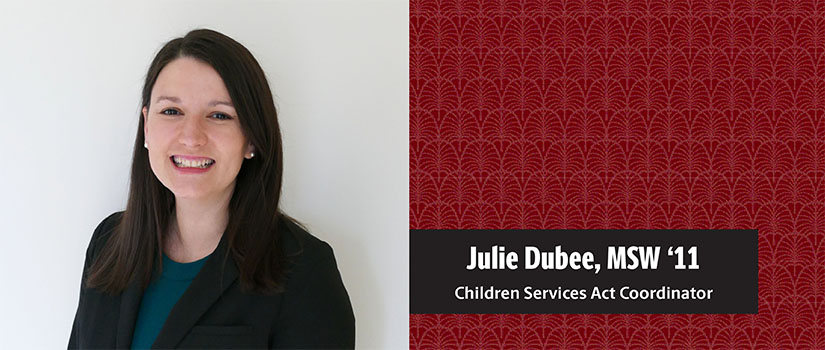Julie Dubee, MSW ’11, admits she was against working in child welfare when she started her graduate studies at the College of Social Work. But her experiences from her field placements and early social work jobs unknowingly prepared her for her current position in child welfare. Instead of the negative stigma associated with social workers and child welfare, Dubee sees her job as assisting families, protecting children, and helping break destructive habits.
In Dubee’s current position as Children Services Act coordinator, she oversees a $7 million budget that funds services for at risk youth and families in Hanover County, Virginia. This includes private day school tuition for families with children who have an individualized education program and foster care funding. Her position was created to ensure continuity between human service agencies.
“The Children’s Services Act was created by the state because schools, courts, social services and mental health agencies were working with the same families but not working together,” Dubee says. “The CSA pulls money from those agencies, so everyone comes to the same place to work together and access funds.”
One of the most satisfying parts of her job occurs every Wednesday as facilitator for the Family Assessment and Planning Team meetings. Representatives from social services, the court system, schools, mental health agencies, and sometimes a private provider or parent compose a team that hears families present their cases for the need for additional supports and services. Once a case is opened, families return every three months to check progress and add, remove or update services as necessary.
“The team usually consists of supervisors with good experiences and knowledge. It’s a brain trust that works together on what works best for families,” Dubee says. “This is much stronger than anything we could do on our own.”
FAPT meetings are followed by the Community Policy and Management Team, which approves the funding for services. Dubee participates in both FAPT and CPMT meetings as the bridge between both teams.
“My position is a mix of clinical and macro,” Dubee says. “With FAPT, I meet with families and make clinical decisions about which evidence-based services are most appropriate. On the CPMT level, I present our budget, the costs, and why it makes sense to fund a certain program.”
Dubee was not interested in working in child welfare when she started her Master of Social Work studies. According to Dubee, when she used to meet people who introduced themselves as social workers, they often followed up by saying that they did not work for social services and were not the person who took children away.
“The College of Social Work helped me see child welfare in different ways, break down the stigmas, and have a different perspective on the work that is done in social services,” Dubee says.
Even though she did not realize it at the time, Dubee’s field placements helped prepare for her current career in child welfare. Her first placement was at Upward Bound, a program that helps low-income students receive necessary support and preparation for college. With three months remaining, the only supervisor with an MSW left, and she transitioned to performing substance use evaluations for UofSC students found with alcohol who were required to come to the counseling center. She was also placed at a local school for her advanced year field placement.
“Working with students at Upward Bound was valuable experience since I now work with youth in foster care who are aging out of the system and navigating the transition to adulthood,” Dubee says. “Doing substance use evaluations was also helpful because that is sometimes an issue facing the families and children we serve. And since I frequently work with schools, having the experience working with a school social worker and understanding special education services has been useful. I switched more than intended, but it has made my experiences richer in working at my current job.”
Dubee, who attended Roanoke College in Virginia for her undergrad studies, returned to the state for her first job after earning her MSW in 2011. She worked for nine months at St. Joseph’s Villa, which housed private day schools for Individualized Education Programs students, to meet needs that could not be met in public school. Some of her past professional experiences, including five years as a foster care social worker, gave her a better understanding of situations she encounters in her current position.
“Schools like St. Joseph’s Villa are not funded by families but through programs that I currently work with now,” Dubee says. “Working there was helpful because half of my budget funds private day schools. It gave me an appreciation of what our vendors are working with.”
Some of the situations and stories that Dubee hears can be troubling or heartbreaking. But working with families is the most fulfilling part of her job.
“There is something spectacular about working for a year with a family and putting services in place and then having them come back to the meeting and hearing them say what is working better, or how things have improved compared to a year ago,” Dubee says. “That's why I keep coming back.”
